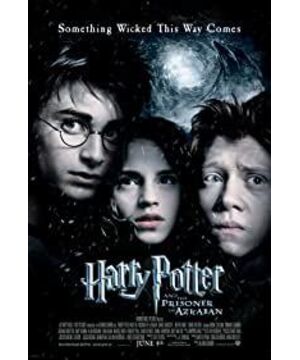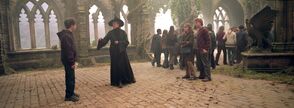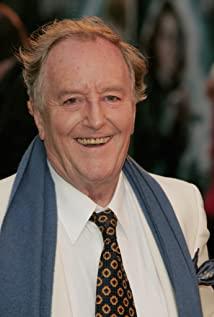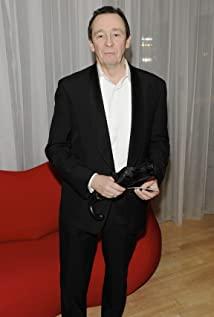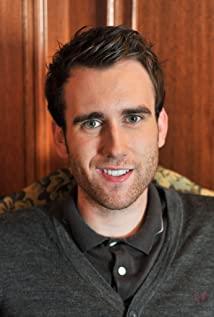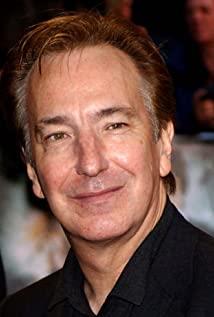In "Harry Potter and the Prisoner of Azkaban" (hereinafter referred to as Ha 3), the most eye-catching magic is probably the time converter: the patchwork of time and space turns the world around, time is this The eternal topic has become more and more exciting after the interpretation of the magical world. And almost all imaginations about time travel can’t get around the famous nemesis-grandmother paradox: if you are lucky enough to go back in time but unfortunately kill your grandmother, then you will not be born; since you have not Born, where did you come from who killed your grandmother?
Einstein's theory of relativity gave mankind a back to the past theoretical support, but until Hawking, the blame for this paradox has not been completely convincingly resolved. "Ha 3" replaces Einstein's almost impossible theoretical hypothesis (infinitely close to or even beyond the speed of light) with the magical but not new tool of the time converter, and returns to the past to change history in the omnipotent magical world; then How did Rowling resolve the embarrassing situation of the grandmother's paradox? Even in the magical world, there is a logical necessity that cannot be violated. Going back to the past will inevitably fall into a paradox. In this regard, Dumbledore emphasizes only to return to the starting point within the prescribed time and not to bump into the past self, nothing more. NS?
In this story, Hagrid’s eagle-headed horse-winged beast, Buckbeak, was sentenced to death for injuring Malfoy. The three of Harry were helpless and unable to help. Later, Azkaban’s fugitive Sirius caught him. Pete, the dwarf star, confirmed his innocence, but because of Lupin's sudden transformation, he was chased by dementors on the shore of the Black Lake with Harry. At the last moment, the mysterious patron saint of stag appeared and rescued them. Harry was lying in the school hospital, and Sirius was locked up at the top of the tower waiting for the dementor to deal with him. After being prompted by Dumbledore, Hermione remembered the magical effect of the time converter, went back to the past with Harry, revisited history, and finally saved Sirius and Buckbeak.
The ending is complete and the truth is revealed. The mysterious patron saint of stag was summoned by Harry himself (from the future). He repelled the dementors and saved the godfather and himself. History has changed-wait a minute, has history changed? If it has changed, what has been changed? Harry and the godfather were brutally poisoned by dementors? No, this did not happen, that is to say, history is still in its original footsteps and has not changed. By analogy, when the three of Harry looked sadly at the execution ground next to Hagrid’s hut, Buckbeak was not killed, and the executioner chopped off a big pumpkin. The two main rescues were roughly the same. The protagonist who returned through the time converter did what the protagonist wanted but could not do at the time. In other words, due to the participation of future visitors, the historical process at this moment is actually determined by two forces, that is, the historical progress at this moment depends on future behavior, and there is only one history.
Suppose, if the protagonist failed to save Buckbeak, then there would be no Sirius who finally escaped smoothly; if Harry failed to summon the powerful patron saint of stag, then he and his godfather would be taken away by the dementor. Soul, then he can't lie in the school hospital, and he won't return to the past with Hermione and bravely and promptly guard the gods at critical moments. In other words, things at this moment must happen because otherwise, there will be no such moment, a weird cycle.
Remember the stone that hit the crock in Hagrid’s hut in the movie? It was put into the pocket by careful Hermione, and when Harry and Hermione returned to the past, it was thrown out by Hermione (from the future) and hit the crock, and then by Hermione who was still in Hagrid’s hut. Put it in your pocket. The design is seamless, beginning and ending. But wait, this is another weird cycle: Hermione in the cabin got the stone because the future Hermione threw it out and hit the earthen jar, and Hermione was able to throw it out because she was in the past. Put it in your pocket, understand? Intact. But here is the problem: There is only one Hermione, where did that stone come from? Where did it go?
Yes, such a cycle after another avoids the annoying logical questioning of the "grandmother's paradox", the grass snake gray line echoes back and forth, and the design is clever. However, these cycles themselves have fragility and indisputability that cannot be ignored. All actions in the cycle must be tightly integrated, or they will immediately fall into a paradox; the tight cycle is like a long snake biting its own tail, the former and the latter are each other's cause and effect, and the beginning of each other. Even ignoring this logical flaw, the seamless connection of all this also has a huge contingency, and what is even more frightening is that contingency still constitutes the support of all this. What if it doesn't happen by accident? Because there is no power to guarantee that chance becomes inevitable unless it is due to fate. Perhaps this huge hidden risk is enough to constitute the reason why the Department of Mystery of the Ministry of Magic strictly controls the time converter. This may be why even the smartest Hermione needs the help of Professor McGonagall to apply for a time converter and to ensure that it must be concealed. Other classmates. As for letting all the time converters be destroyed in battle in "Harry Potter and the Order of the Phoenix", is it also a scruples of opportunity?
The interpretation of contingency theory is not a powerful response to the "grandmother paradox" interrogation, because the "grandmother paradox" itself is a contingency hypothesis; accidental accumulation can easily be classified as fatalistic thesis. At the same time, the weird cycle itself seems to violate the one-dimensional existence of events, and this is precisely the foundation of returning to the past-if time is reciprocating, then why go back to the past?
Of course, there are parallel universe hypothesis and Hawking's non-intervention theory for the explanation of the "grandmother paradox". Parallel universes will undoubtedly make the story extremely complicated. For example, Harry in one history has ended in the kiss of a dementor, but in another history, Harry escaped unscathed; as for the theory of non-interference, if it is As the support of the story, I am afraid that most of the scenes may be horrible. According to Hawking, it is impossible for the accidental accident of the grandmother to be killed due to the intervention of the laws of physics, so how can all the accidents in the story be explained?
However, the author thinks that another segment in "Harry Potter" can be used as a perfect interpretation of the past: Dumbledore's Pensieve. The effect of going back to the past is equivalent to entering an immersive memory, which is real and unchangeable. For the deceased, perhaps it is more in line with the logical framework of the existing three-dimensional world if it cannot be changed! Otherwise, wouldn't the smart wizards use the time converter to go back in time (before they were completely destroyed by the War of the Division of Mysteries) and get rid of this "the most terrifying dark wizard in the history of the wizarding world" before Voldemort's wings were reached. NS? Because all they need to pay attention to is just returning to the present on time and not being hit by their past self, this cost does not seem to be very high.
View more about Harry Potter and the Prisoner of Azkaban reviews


